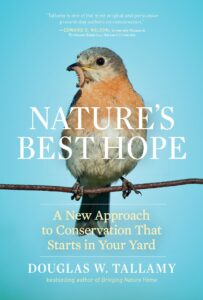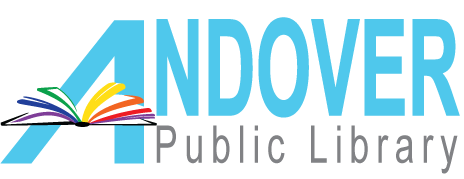 I will usually avoid non-fiction books like the plague. Give me a good mystery/detective/legal novel and I will ignore all other demands on my time until the book’s end. But when “Nature’s Best Hope” by Douglas Tallamy was returned by a patron I was intrigued by the title. I put it on hold, received it, then let it sit on my book pile at home for a while as I read what I thought were more appealing books until it was almost due for return. I did say I am not keen on reading non-fiction.
I will usually avoid non-fiction books like the plague. Give me a good mystery/detective/legal novel and I will ignore all other demands on my time until the book’s end. But when “Nature’s Best Hope” by Douglas Tallamy was returned by a patron I was intrigued by the title. I put it on hold, received it, then let it sit on my book pile at home for a while as I read what I thought were more appealing books until it was almost due for return. I did say I am not keen on reading non-fiction.
I became as absorbed with “Nature’s Best Hope” as I would have a murder and mayhem novel! Mr. Tallamy was clear, descriptive, reasoned, and convincing as he explained why we humans should care about native plants, insects, animals and their interconnection, and how effortless small steps can have beneficial impacts on our habitat and ultimately, we humans.
I have been vaguely aware that I have not seen as many butterflies, honeybees, grasshoppers, etc. as I did in the recent past and 20 years is very, very recent in comparison to the age of our planet. I do not recall when I last saw a Monarch Butterfly, beautiful creatures once so numerous as to be unremarkable.
This book explained in plain language (I for one do not have a degree in anything, let alone biology) why our most important plants and creatures may be at risk and how we humans can help preserve, and potentially improve, what presently exists. His descriptions of food webs, biomes and how all the pieces of nature all around our planet earth have evolved together over millions of years and cannot be completely healed, if we accept there has been damage, in a few human years made so much sense to me.
Not all nature’s problems are directly humanity’s fault. But humans have the power and can take positive steps to make corrections that can aid in protecting and improving our natural world. And much to my surprise, we can do so in small ways that require less effort than one would think.
I spend a lot of time in the gloom of winter dreaming about the coming light of spring, summer and fall. I am really looking forward to this next season when I can put my new knowledge into practice.
I highly recommend this book and hope to take advantage of future programs on this and related topics at our terrific library or others in the area. Get a copy of our newsletter, calendar or visit our website and Facebook page for details of upcoming events.
~Cindy Schwenk
